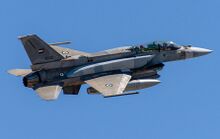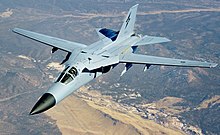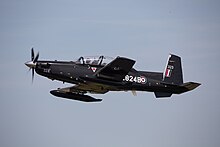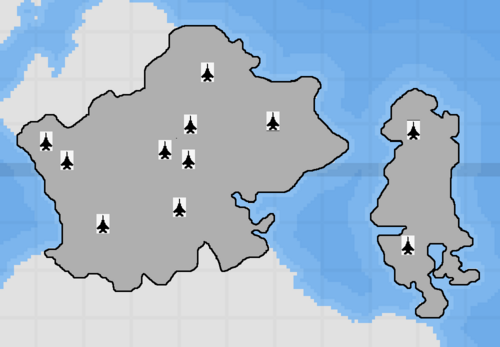NV Norvish Air Force: Difference between revisions
(Equipment) |
m (word fixes) |
||
| Line 27: | Line 27: | ||
| mascot = | | mascot = | ||
| anniversaries = 1 July | | anniversaries = 1 July | ||
| equipment = | | equipment = ℟1.94 billion <br>(16.2% of Armed Force Budget) | ||
| equipment_label = | | equipment_label = Budget | ||
| battles = | | battles = | ||
| decorations = | | decorations = | ||
Revision as of 03:25, 23 June 2022
| Norvish Air Force | |
|---|---|
 Flag & Coat of arms | |
| Founded | 1 July 1928 |
| Country | |
| Type | Air force |
| Role |
|
| Size | 14,320 personnel 294+ aircraft
|
| Part of | NV Norvish Armed Forces |
| Headquarters | Trelmen |
| Motto(s) | Vanguard of the sky |
| Anniversaries | 1 July |
| Budget | ℟1.94 billion (16.2% of Armed Force Budget) |
| Commanders | |
| Chief of Staff | Chestley Mosfield |
| Chief of Air Force | Jay Gallagher |
| Deputy Chief of Air Force | Reuben Steviano |
| Air Marshall | Rhys Owen Harnett |
| Air Vice Marshall | Mylo Walsh |
| Insignia | |
| Roundel |   |
| Fin flash |  |
The Norvish Air Force (NAF) is the principal aerial fighting branch of the Norvish Armed Forces, along with the Navy and the Ground Forces. The remote origins of the NAF go back to the early 20th century with the establishment of the first military air unit in 1926, the Military Aeronautics School in 1928, alongside the Ground, and the Navy aviation service. The NAF is commanded by the Chief of Staff of the Air Force, a subordinate of the Chief of the General Staff of the Armed Forces for operational matters and a direct subordinate of the Minister of National Defense for all other matters. The Chief of Staffs are the only officer in the Air Force with the rank of general (four-star rank).
Presently, the NAF is an entirely professional force made of career personnel (officers and NCOs) and of volunteer personnel (officers, NCOs, and enlisted ranks). As of 2022, the NAF employed a total of 14,320 active personnel consisting of pilots, infantry, staffs, maintenance worker, engineers, airfield defense unit and so on. Additionally, the Air Force further included 1,800 reservist and 562 civilian employees.
It operates the majority of the country's fixed wing aircraft, numbering 180+ assets. The other 114 aircraft belongs to the Ground force and Navy aviation command, which works under their respective branches for specific tasks. And altough both the Ground and Navy aviation also operates rotary-wing aircraft for transporting, patrols, logistics etc, The authority of using large aircraft assets is directed under the Air Force Command such as the capabilites of long range bombing and maintaning overall air securities in the country. The NAF provides support across a spectrum of operations such as air superiority, precision strikes, intelligence, surveillance and reconnaissance, air mobility, space surveillance, and humanitarian support.
Organization
Command Structure
The new general organization presently in force for the Norvish Air Force was introduced in December 2013. Accordingly, with this organization, the NAF is commanded by the Chief of Staff of the Air Force and includes:
- Main Headquarters, located in Trelmen
- Theathre Command, Trelment & Caerleon
- Logistic Support Directorate
- Personnel and Employment Directorate
- Economic Affairs Directorate
- Subordinate Elements:
- Combat Wings – active in commanding specific air wings
- Air Mobility Group – air lift and aerial refuelling capability
- Air Doctrine Directorate – information warfare, intelligence and capability development
- Combat Support Group – combat support and air base operations security
- Surveillance and Response Group – surveillance and reconnaissance capability
- Air Force Training Group – air force training capability and development
Force Structure
The main operational formation of the NAF is the "Wing", roughly equivalent to an army brigade or regiment. A wing is normally composed of 2/3 operational groups (army battalion equivalents) including the aviation squadrons and a flight operations support squadron. An operations group is normally composed of two or three active wings, each one normally consisting of 18 to 30 aircraft. For example, the 6th fighter wing, with its base in Trelmen Air Base, is formed by three squadrons with 8 XXX each. Another group within the wing is the Material Unit, providing maintenance and repairs to the aircraft, their weapons and systems. The group completes the typical wing structure and it is the air base group, providing the functioning of the air base as a military installation. Each squadrons designated with different missions, therefore most squadron contain the multi-mission fighter role, while the rest operates in non-combat missions.
For a long period of time the combat units of the Norvish Air Force were organized into a 1st Air Theatre (deployed in the western part of the country and headquartered in Trelmen) and a 2nd Air Theatre (deployed in the eastern part of the country and headquartered in Caerleon). The two separate command section primarily intended for easier organization, as such, the 1st Theatre can mobilize air units in case of impending Bakyernn's invasion to the southwest Harthorne and protect the armed forces integrity near the Norrteric sea. While the 2nd Theatre maintain air supperiority with less burden around Grimburg Isles.
| Insignia | Unit Name | Aircraft Flown | Location |
|---|---|---|---|
 |
1st Strike Wing | 46,000 | 20,000 |
 |
6th Fighter Wing | 1,800 | 562 |
 |
8th Air Wing | 9,300 | 4,611 |
| 13th Air Wing | 3,000 | 4,000 | |
| File:ROKA 3rd Infantry Division Insignia(White Skull).png | 14th Fighter Wing | N/A | |
 |
15th Fighter Wing | N/A | 6,200 |
 |
20th Fighter Wing | N/A | 4,730 |
 |
25th Air Wing | 35,100 | 21,402 |
Air Bases
Flying activity in the country is carried out by a network of bases, platforms and the air and space defence radar systems. It is supported by bases, which are supervised and maintained by staff, operational centres, warehouses, workshops, and schools. Both in Norvinia and abroad, bases have similar infrastructure to provide standardised support.
The Norvish Air Force own various installation across the country, as of 23 July 2022:
- Within the metropolitan territory around Ashborne, NAF has 18 airbases, out of the which 5 are major aeronautical platform with perceived runways, 2 minor platform runway, 5 Bases with non-platform, two schools, 3 air detachments and a reserve dedicated base.
- Beyond the Ashborne metropolitan, there are 6 major Aerial Bases with permanent runway detachments, and 3 minor runway.
Most of Norvish airbases house anti-air defense capabilities equipped with high-tech SG2ix radar system to carry out air surveillance and air traffic control, Vulcan Air System medium-long range surface-to-air missile operated alongside Ground Forces and Home Guard, while others house material warehouses or command posts. Temporary and semi-permanent foreign deployments include transport aircraft at Kiem, Visargia.
As swift as the Norvish Air Force operates, the closure of aerial bases is more constant and immediate, having known a strong acceleration since the 1950s. An air base commander has authority over all units stationed on their base. Depending on the units' tasks, this means that they are responsible for approximately 400 to 2000 personnel. On average, a base, made up of about 1100 personnel (near 30% included civillian personnel). Besides, NAF airbases provides a yearly economic boost to its area of about 30 million roulles. Consequently, determining the sites for air bases constitutes a major part of regional planning.
Ranks
The rank structure of the NAF was established to ensure that the service remained separate from the Army and Navy. The service's predecessors, the Ground Aviation and the Naval Avatiation, had used the Army's rank structure. In January 1941 it was decided by the Chief Of Staffs that the NAF would adopt the new structure that will be adopted by itself. As a result, the Air Force's rank structure until today came to be: Aircraftman, Leading Aircraftman, Corporal, Sergeant, Flight Sergeant, Warrant Officer, Officer Cadet, Pilot Officer, Flying Officer, Flight Lieutenant, Squadron Leader, Wing Commander, Group Captain, Air Commodore, Air Vice-Marshal, Air Marshal, etc.
Officer insignia
| Rank Grouping | General/Flag Officers | Field/Senior Officers | Junior Officers | Officer Cadet | |||||||||
|---|---|---|---|---|---|---|---|---|---|---|---|---|---|
| Code | OF-10 | OF-9 | OF-8 | OF-7 | OF-6 | OF-5 | OF-4 | OF-3 | OF-2 | OF-1 | OF-D | ||

|

|

|

|

|

|

|
|||||||
| Rank Title: | Marshal of the NAF | Air Chief Marshal | Air Marshal | Air Vice Marshal | Air Commodore | Group Captain | Wing Commander | Squadron Leader | Flight Lieutenant | Flying Officer | Pilot Officer | Officer Cadet | |
Other ranks insignia
| Rank Group | Non-commissioned officer | Other ranks | |||||||||
|---|---|---|---|---|---|---|---|---|---|---|---|
| Code | OR-9 | OR-8 | OR-7 | OR-6 | OR-5 | OR-4 | OR-3 | OR-2 | OR-1 | ||
| No insignia | |||||||||||
| Rank Title: | Warrant Officer of the Air Force | Warrant Officer | Flight Sergeant | Sergeant | Corporal | Leading Aircraftman | Aircraftman | Recruit | |||
Equipment
Combat Fixed-Wing
| Name | Image | Origin | Type | Number | Notes |
|---|---|---|---|---|---|
| Interceptor | |||||
| MEF-21B Swifter | 
|
Regulus |
Multirole Fighter | 14 | Better version of MEF-14, Its armament of up to 18 air-to-air missiles, further improved combat persistence with exceptional distance and high-speed interdiction without relying on escort or electronic- warfare aircraft |
| MEF-14 | 
|
Regulus |
Fighter | 45 | Compact single-engine air superiority figher jet to maximize maneuverability |
| Attacker | |||||
| Sigeward Raider | 
|
Sigeward |
Dedicated Ground Air Support | 24 | Advanced multi-purpose strike and reconnaissance aircraft capable of carrying up to 4t of bombs & Missile, as well as two 20mm cannon. |
| Sigeward Dasher | 
|
Sigeward |
Light Attacker/ASW | 10 | is a strike aircraft designed for low practical range of weight, cost, and complexity over which to reduce detection and increased stealth. |
| Bomber | |||||
| SBB2M | 
|
Template:Country data Layfet | Long Range Bomber | 7 | The SBB2M was an all-weather bomber aircraft capable of high-level penetration of enemy defences to deliver great destruction on the target. |
Utility Fixed-Wing
| Name | Image | Origin | Type | Number | Notes |
|---|---|---|---|---|---|
| Transport | |||||
| TBN-40 | 
|
Regulus |
Heavy Transport | 4 | Air Force's four-jet heavy transport, it was conceived and used to fly strategic military cargos into front-line air bases in the most extreme operational conditions. |
| B17J Warrior | 
|
Template:Country data Layfet | Tactical Transport | 16 | Dimensionally light and tactical aircraft used to transport troops, cargo and performs airdrops and medical evacuation in short time. |
| Z660 | 
|
Aerial Refuelling | 5 | Multirole aircraft, mainly as aerial refuel tanker but can aslo be employed as a cargo or troop transport aircraft. | |
| Trainer | |||||
| Ferox | 
|
Regulus |
Trainer | 27 | used for primary manuever training or interceptor, includes datalink and integrated electro-optical sensors along with several light weapons configurations. |
| Serpent | 
|
Regulus |
Trainer | 18 | Even within the development stages, Serpent was intended to also serve as a single-seat ground-attack fighter; both the trainer and fighter models were developed with the export market in mind. Designed to carry a centreline gun pod, such as 20 mm cannon, two under-wing pylons, and up to four hardpoints for fitting armaments and equipment |
Helicopter
Work in Progress
